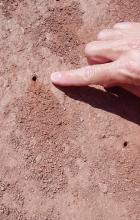Extracting Heaven . . .
SPRING
by Pastor William Jay (1769-1853)
Thou renewest the face of the earth.
Psalm civ. 30.
All nature is a book, and the various parts of it are as so many multiplied pages in which we may read and consider “the wonderful works of God.” The seasons of the year are every way interesting. They are necessary for the production of our food, and the preservation of our health. Their succession adds to the beauty of creation. Their revolutions furnish us with subjects of reflection, and lessons of importance.
The [spring] season is arrived in which we behold the renovation of nature. Let us endeavour to render it profitable to our minds.
I. David was an attentive observer of the works of creation. Many a fine evening did he employ in “considering the heavens, the works of God's finger, the moon and the stars which He has ordained.” He rose early, and beheld the “sun as a bridegroom coming out of his chamber, and rejoicing as a strong man to run a race.” He looked abroad in winter and exclaimed, “He sendeth abroad His ice like morsels, who can stand before His cold?” He rejoiced when more favorable weather encouraged him to walk abroad: he observed “the birds building their nests, the springs running among the valleys, the grass growing for the cattle, and herbs for the service of man.” And hailing the revival of a faded world, lifted up his eyes and said, “Thou renewest the face of the earth.”
There are few real lovers of nature; there are few who so behold its scenes as to pause and admire, till they have imbibed a sympathy with them; till they feel themselves at home in them; till they are detached from everything human, and little, and debasing. Let us go forth into the field to meditate: meditation is often better than books. Our own thoughts will do us much more good than the opinions of others. Wisdom and truth are shy in the world, but here they are easily discovered and secured. Danger often attends our perusal of the works of men, but there is no hazard in pursuing knowledge among the works of God. People complain of the world, and confess whenever they return from its companies and diversions, that “all is vanity and vexation of spirit”—why will they not come forth and refresh themselves here? Why will they not leave the wilderness and enter this garden of the Lord? Here I live in a world of my own— here I feel my independence and my freedom—here I can learn how I have been overcome, and where I must place a watch and a guard—here the good thoughts, which were scattered and weak before, are collected into a powerful motive, and bear down all opposition to duty—what was wavering before, is now decided—what was timid, grows courageous. When I go into the field, I enter my closet, I shut the door about me; I admit what company I please; I exclude the vicious who would pollute, and the trifling who would interrupt; I hear not the folly of the vain, or the slander of the malicious, that world of iniquity which drops from the tongue; “I pray to my Father [who] is in secret; mine eye poureth out tears unto God;” I have an emblem of final repose—“here the wicked cease from troubling, and here the weary are at rest.”
“God made the country, and man made the town.” Nevertheless, how many are there who leave the works of the Creator to bury themselves among those of the creature; and while professing to admire the beautiful and the marvellous, disregard the wonders that are perpetually springing up around them. They will go any distance, incur any expense, to see a piece of [machinery], sculpture, painting; while they pass by productions infinitely more curious, and finished in the way. They are struck with a fine robe, but never contemplate a lily, “and yet I say unto you, that Solomon in all his glory was not arrayed like one of these.” When a man of fame announces a design to perform anything, thousands flock around him; while God, working day by day the most astonishing effects, is unnoticed; and no one is drawn forth to attend to Him, though He has said, “I will that men magnify My works, which they behold.”
II. It becomes us not only to observe nature, but to observe it devotionally, and as Christians. There is a difference between viewing and improving these things: there is a difference between our studying them as mere admirers and philosophers, and applying them as men formed by Divine grace for a life of communion with God. It is the command of the Apostle—“Whatsoever ye do in word or deed, do all in the name of the Lord Jesus, giving thanks to God and the Father by Him.”
See a Christian among the works of nature. He looks after God in all—for he needs Him in all: and he is enabled to find Him. Though familiar with the effect, he does not disregard the Cause; with him, common instrumentality does not conceal Divine agency. He maintains in his mind a connection between the Author and the work; and the one reminds him of the Other. He walks with Him in the ways of His Providence, as well as in his goings in the sanctuary, adores Him in the field as well as in the temple, and acknowledges Him in the ordinary course of nature, as well as in the extraordinary displays of His power, and wisdom, and goodness.
He also makes them images to remind him of better things. The rising sun brings to his thoughts, “The Sun of righteousness arising with healing under His wings:” a flowing spring, the influence of the Holy Ghost: the rain and the dew, the doctrine of the Gospel. Thus, by a holy chemistry, he extracts heaven from earth.

From these scenes he also derives motives to devotion, and encouragements to confidence. For instance: does he view a proof of Divine wisdom? He cries, “O how able is this God to teach me, to manage all my concerns—how wonderful in counsel, how excellent in working!” Does he contemplate a display of Divine power? “How able is this God to preserve, sustain, deliver me? Is anything too hard for the Lord?” Does he observe instances of His bounty? He asks—“Can He who hears the ravens that cry refuse supplies to His children?”
Nor does he partake of the bounties of nature like a brute, only concerned to gratify his animal appetite, and entirely regardless of him from whom every indulgence comes. He receives them from the hand of his heavenly Father; he tastes His love in them; he cries, “O that men would praise the Lord for His goodness, and for His wonderful works to the children of men! Bless the Lord, O my soul—who gives me all things richly to enjoy,” and who provides, not only for my relief, but my delight. I will live to Him who lives in so many ways for me, and by “His mercies I will present my body a living sacrifice, holy and acceptable unto Him, which is my reasonable service.”
III. Let us observe and adore this wonderworking God in renewing the face of the earth. How many times has He done this since the creation? He does it every year. The change is equally remarkable and pleasing. See the winter drawing off his army of winds, and frosts, and snow, and hail—and spring succeeding the monarch of desolation. Under His soft and gentle reign, all begins to smile: life in a thousand ways breaks forth; all is verdure [greenness], and fragrance, and beauty: all is joyous—what variety of colors, what harmony of sounds! “The valleys stand thick with rising corn, and the little hills rejoice on every side,” while a voice from the fields and meadows calls— “Arise—and come away; for lo! the winter is past, the rain is over and gone. The flowers appear on the earth; the time of the singing of birds is come, and the voice of the turtle[dove] is heard in our land.”
Let us remember, that He who renews the face of the earth, can renew the church. Think of any particular cause—however depressed, He can revive it: however small, He can increase it. When His influences descend, “His word comes down like rain upon the mown grass, as showers that water the earth;” and His people are filled with all the fruits of righteousness—the congregation is like a field which the Lord has blessed. Or think of His cause at large.—He can drive away errors, and superstition, and animosities from the nations of the globe, and bless the world with the Gospel of peace, and the means of salvation—and the “wilderness, and solitary place shall be glad for them; and the desert shall rejoice, and blossom as the rose. It shall blossom abundantly and rejoice even with joy and singing; the glory of Lebanon shall be given unto it, the excellency of Carmel and Sharon; they shall see the glory of the Lord, and the excellency of our God.”—
He can also renew the soul. The Fall has reduced our spiritual powers to a state of desolation the most deplorable. Now when a sinner is led to see and feel this, he prays, “Create in me a clean heart, O God, and renew a right spirit within me.” And we read of the “renewing of the Holy Ghost; and of being renewed in the spirit of our minds. Thus God beautifies the meek with salvation,” and the change in nature is an imperfect representation of the change made in the soul by Divine grace. This can illuminate the darkest understanding, and soften the most rebellious will; this can tranquillize the most troubled conscience, and sanctify the most depraved affections. After conversion the people of God may have a winter season; their growth may be checked; everything may appear to be dead; they may feel the chilling absence of the Sun of righteousness, and sigh, O when wilt Thou come unto me. But when He returns, all revives: then the believer is quickened, and expands, and buds, and brings forth “much fruit:” “he has life, and he has it more abundantly.”
Again. He can renew the body. Has sickness invaded thy frame—art thou “made to possess months of vanity, and are wearisome nights appointed unto thee;” art thou saying my “purposes are broken off—mine eye shall no more see good? Remember, He killeth and maketh alive, He bringeth down to the grave and raiseth up.” Every disease is under His control and goes at His bidding. He can re-color thy cheeks, “strengthen thy weak hands, and confirm thy feeble knees, so that thy youth shall be renewed like the eagles.” Let the body die—even then we are not hopeless—He shall renew it. “So is the resurrection of the dead. It is sown in corruption, it is raised in incorruption: it is sown in dishonor, it is raised in glory; it is sown in weakness, it is raised in power: it is sown a natural body, it shall be raised a spiritual body. According to His promise, we look for new heavens, and a new earth, wherein dwelleth righteousness. And God shall wipe away all tears from our eyes: and there shall be no more death, neither sorrow, nor crying, neither shall there be any more pain: for the former things are passed away.”
—To conclude. The seasons of the year have often been considered as emblems of human life.— Youth is the spring. Yes, my dear young friends, yours is the season of which nature, lovely nature, now reminds us. Think of this in all your walks. How pleasing and how beautiful is spring! But how short, how fading—yet how important! On this all the year depends. If no blossoms now appear, or if these blossoms be destroyed, no glory in summer, no abundance in autumn, no provision in winter.
My young friends, you are now forming your future destiny, and giving a character to your future years. O seize these valuable hours for purposes the most momentous. The improvement of your understanding, the correction of your tempers, the formation of your habits, the enlargement of your capacity to serve God and your generation, and above all—diligence in “working out your salvation with fear and trembling.”—
And, O thou God of all grace, hear our prayer! “Let Thy work appear unto Thy servants, and Thy glory unto their children, and let the beauty of the Lord our God be upon us: and establish Thou the work of our hands upon us; yea, the work of our hands establish Thou it; That our sons may be as plants grown up in their youth, and our daughters as corner stones, polished after the similitude of a palace.” Amen.


